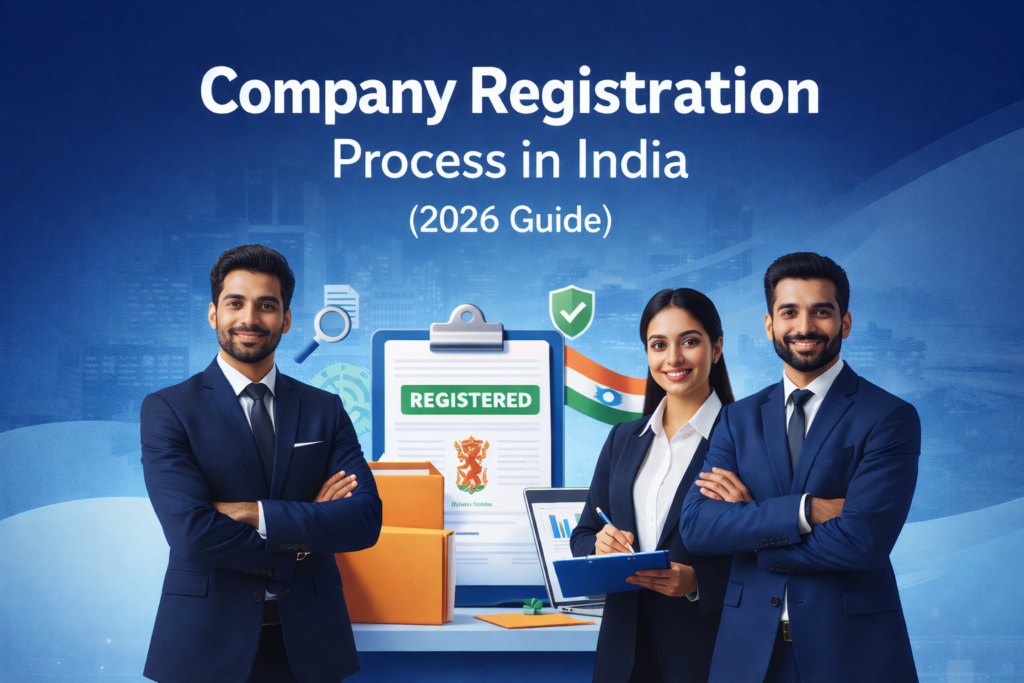Company Registration in India: Start Right with Bizsimpl

It’s thrilling to start a business, but you need to make sure it’s legal before you can really get it going. That’s where Company Registration in India plays a crucial role The sort of business structure you choose sets the tone for everything that comes after it, from getting money to following the rules and growing your firm. This is true whether you’re a single entrepreneur, a partnership, or a group of co-founders working on a scalable startup.
In this blog, we’ll guide you through the essentials of Company Registration in India, help you understand the differences between common business structures like Private Limited Company (Pvt Ltd), Limited Liability Partnership (LLP), and One Person Company (OPC), and show you how Bizsimpl makes the registration process easy, quick, and effective in all Indian states as Company Registration in India.
Why Company Registration in India is Crucial for Every Business
Company Registration in India is more than just a legal formality — it’s the foundation of your business identity. Here’s why it matters in Company Registration in India:
- Recognition by the law
When you register your business, it becomes a legal entity that is recognised. This lets it own things, take on debts, and sign contracts in its own name. - Trustworthiness with Customers and Investors
Clients, vendors, and potential investors trust registered firms more than unregistered ones. It shows that you mean business and have registered your firm with the right people. - Getting money to grow a business
Pvt Ltd and LLP are examples of registered businesses that can get money by getting investors. When you register a business, you can get venture money, loans, and even government grants. - Organised Governance
When you Company Registration in India, it has to follow a set structure. This makes it easy to set up roles, duties, and rules for making decisions and growing the firm.
Knowing the differences between Pvt Ltd, LLP, and OPC
When opting for Company Registration in India, choosing the right structure is essential. Each has distinct features, benefits, and use-cases. Here’s a breakdown in Company Registration in India:
Private Limited Company (Pvt Ltd)
A Pvt Ltd Company is the most common choice for new businesses since it limits the liability of its shareholders and makes it easier to transfer shares.
Important Features:
- Needs at least two directors and two stockholders.
- Shareholders are only responsible for the amount of their shares.
- Preferred for finance, growth, and a good professional reputation.
- Must follow certain rules every year.
Best for: New businesses that want to grow, get outside capital, or want to grow quickly.
Limited Liability Partnership (LLP)
An LLP is a mix of a partnership and a business. It has the benefits of limited liability and the opportunity to be flexible in how it runs.
Important Features:
- At least two partners are needed.
- Separate legal identity from partners.
- Great for small enterprises and professional firms.
- Less compliance work than Pvt Ltd.
Best for: Small to medium-sized businesses, service providers, and consultants who want freedom without a lot of rules.
One Person Company (OPC)
An OPC is a relatively new type of business structure in India that lets one person run a firm and get corporate benefits.
Important Features:
- One promoter owns 100% of the company.
- Protection from limited responsibility.
- Can change into a Pvt Ltd when the business gets bigger.
- Easier to follow the rules than a Pvt Ltd.
Best for: freelancers or solo enterprises who want to work with limited responsibility and official acknowledgement.
Step-by-Step: Company Registration in India for Each Structure
- Name Reservation: Choose a name for your business that is one of a kind and get it approved by RUN (Reserve Unique Name) on the MCA portal.
- Digital Signature Certificate (DSC): Get DSCs for the directors to sign documents online.
- Use the SPICe+ form to apply for a Director Identification Number (DIN).
- To apply for incorporation, fill up the SPICe+ form and send it in with the MOA, AOA, and any other necessary papers.
- Certificate of Incorporation (COI): After your application is granted, the Registrar of Companies (RoC) will send you your COI and CIN.
- Registering a Limited Liability Partnership (LLP) Name Approval: To receive a unique name, fill out the RUN-LLP form.
- Digital Signature: Get DSCs for your partners.
- Filing Incorporation Documents: To file for LLP incorporation, use Form FiLLiP.
- Draft and send in your LLP Agreement within 30 days after forming the company.
- Certificate of Incorporation: Given once RoC has successfully checked it.
- How to register a One Person Company (OPC)
Pick a name for your business: Use RUN to reserve a name. - Get your DSC and DIN, which you need to fill out incorporation forms.
- Fill out the SPICe+ Form, which has information about the nominee, the director, and the MOA/AOA.
- Get your COI: After your application is granted, you will get a certificate of incorporation with your company’s CIN.
Common Documents Required for Company Registration in India
No matter if you want to form a Pvt Ltd, LLP, or OPC, you will need to have some of the same documents:
PAN card for Directors/Partners
- Aadhaar card
- If you are an NRI or foreign national, you need a passport.
- Picture the size of a passport
- Proof of address (utility bill, bank statement)
- For the Registered Office, you need a lease or proof that you own the property.
- Owner’s NOC
- A utility bill (for electricity, water, etc.) that is no more than two months old
There may be more criteria for each structure, but you don’t have to worry about them with Bizsimpl. There are document checks and clear instructions for each stage that are specific to the structure you choose.
How Bizsimpl Simplifies Company Registration in India

With numerous forms, processes, and verifications, Company Registration in India can seem overwhelming — especially for first-time founders. That’s where Bizsimpl makes a powerful difference.
- Local Knowledge, Nationwide Service
Bizsimpl can help you Company Registration in India, whether you live in Delhi, Mumbai, Bangalore, Chennai, or a smaller town. You don’t have to go to an office; everything is digital and easy to use. - Support for Startups
Bizsimpl knows what business owners want: clear, quick, and easy. Our platform is designed to help you at every stage, with smart dashboards, reminders, and the ability to track your registration process in real time. - Guidance from Experts
Bizsimpl’s professionals make sure that your paperwork, application, and compliance with the Ministry of Corporate Affairs (MCA) are all correct and on point, which keeps you from having to wait or get turned down. - Digital Process from Start to Finish
The entire journey of Company Registration in India with Bizsimpl is managed online — from name approval to incorporation certificate. This not only saves time but also reduces human error and paperwork.
Why it’s important to pick the right business structure
When it comes to Company Registration in India, one of the most important decisions is selecting the appropriate structure for your business. Your choice of business structure—Private Limited Company, Limited Liability Partnership, or One Person Company—can have a big effect on your operations, funding options, taxes, and compliance obligations in the long run in Company Registration in India.
Let’s talk about why it’s important to make the appropriate choice from the start:
- Ability to grow
A Pvt Ltd Company is the best type of business structure if you want to get money or grow quickly. Because of its obvious shareholding, competent governance, and openness, investors generally choose Pvt Ltd above alternative structures. - Managing Liabilities
Pvt Ltd, LLP, and OPC all have limited liability. This means that your personal property is safe if the business gets into debt or is sued. But the level of protection and duties are not quite the same. For instance, LLP partners are protected from what other partners do, which can be helpful in partnerships that provide services. - Control and Ownership
If you start a business by yourself, registering as an OPC lets you own 100% of it and still get the benefits of being a corporation. On the other hand, LLP and Pvt Ltd need at least two people to be involved, but they share responsibilities and talents. - Obligations to Follow the Rules
There are different levels of rules that any structure must follow:
- Pvt Ltd Companies have greater rules for following the law, like having board meetings and producing yearly reports.
- LLPs have to follow the law less strictly since they have less legal duties.
- OPCs have easier compliance obligations.
If you make a smart choice today, you won’t have to restructure or convert your business tomorrow, which may be costly and time-consuming.
Which Structure Works Best in the Real World?
Let’s look at how different kinds of founders and businesses choose to register their firms choose Company Registration in India :
- Use Case 1: A tech startup with more than one founder
Two developers in Bangalore are working on a SaaS solution and want to get startup capital within a year. For them, it makes sense to register as a Private Limited Company. It lets you share equity, draws in investors, and gives your brand a lot of credibility. - Use Case 2: A small marketing consulting firm
Two marketers with a lot of expertise want to launch a business that helps new businesses with their branding. They don’t want to generate money and would rather have a system that is easy to keep up. In this scenario, an LLP gives them freedom, limited liability, and low costs for following the rules. - Use Case 3: An Entrepreneur Who Used to Be a Freelancer
A freelance designer in Delhi wants to make her firm official and start bidding on big contracts. She decides to register as a One Person Company, which gives her minimal liability and legitimacy while yet letting her keep complete ownership.
These real-life scenarios highlight how Company Registration in India isn’t just about ticking legal boxes — it’s about choosing a structure that supports your goals.
Frequently Asked Questions: Company Registration in India
- How long does it take to set up a business in India?
With services like Bizsimpl, registering a business usually takes 7 to 10 business days, depending on how quickly the documents are sent in and how long it takes for the MCA to approve them. - Is it possible to register my business from anywhere in India?
Yes, Company Registration in India can be done completely online, regardless of your location. Bizsimpl offers remote registration across all Indian states. - Do you have to have a registered office address?
Yes, you need to have a registered office address. This is where the Ministry of Corporate Affairs (MCA) will send official messages. It might be a rented space or property that you own, as long as you have the right papers. - What if I don’t have a partner?
You might choose the OPC (One Person Company) structure. It’s perfect for freelancers and solo founders who want to run a business like a professional. - What do you have to do after you register?
Once your business is registered, you will have to do things like file annual reports, preserve records, and do other ROC-related chores dependent on how your business is set up. Bizsimpl also tells you what to do next once you incorporate so you never get lost.
Bizsimpl: Your Trusted Partner for Company Registration in India
Unclear rules, old advice, and broken platforms are common problems for entrepreneurs and new businesses. Bizsimpl eliminates these challenges by offering a reliable, end-to-end solution for Company Registration in India.
This is what makes Bizsimpl different:
- Customised Registration Workflows
Bizsimpl makes the registration procedure fit your business kind, whether it’s a Pvt Ltd, LLP, or OPC. You will get personalised checklists, updates, and help from experts to make sure you don’t miss anything. - A smooth online experience
The old way of registering typically requires a lot of documentation and trips to the office. With Bizsimpl, everything is done online, from issuing a DSC to getting approval for a name to incorporating the business. - Help from an expert from start to finish
Stop searching for every step on Google. Bizsimpl gives you clear instructions, checks your documents, and makes sure that every form is filled out correctly, which lowers the chance of being turned down. - One platform for all of India’s states
Bizsimpl offers the same registration services all over India, from big cities like Mumbai and Bangalore to little Tier-2 towns.
Conclusion: Use Bizsimpl to Make Your Business Official
Company Registration in India is the first official step toward building a legitimate, scalable, and trusted business. The correct foundation is what makes the difference, whether you choose a Private Limited Company, a Limited Liability Partnership, or a One Person Company.
Bizsimpl gives business owners the tools they need to get off to a good start. Bizsimpl makes incorporation easy by giving you experienced guidance, making digital processes easier, and offering service all over the country. This lets you focus on what matters most: expanding your business.
Choose Bizsimpl and make your business official the smart, easy way if you’re ready to take the initial step.
Blog's
Company Registration in Bangalore with BizSimpl Consultancy
Company Registration in Bangalore: Step-by-Step Guide for Startups Company Registration in Bangalore is the first…
Process for Registering a Company in India: Step-by-Step
On This Page What Company Registration Means End-to-End Registration Process Overview Types of Company Structures…
Startup Incorporation in India: Essential Steps and Benefits for New Entrepreneurs
Startup Incorporation in India: Essential Steps and Benefits for New Entrepreneurs India has quickly developed…












One Response